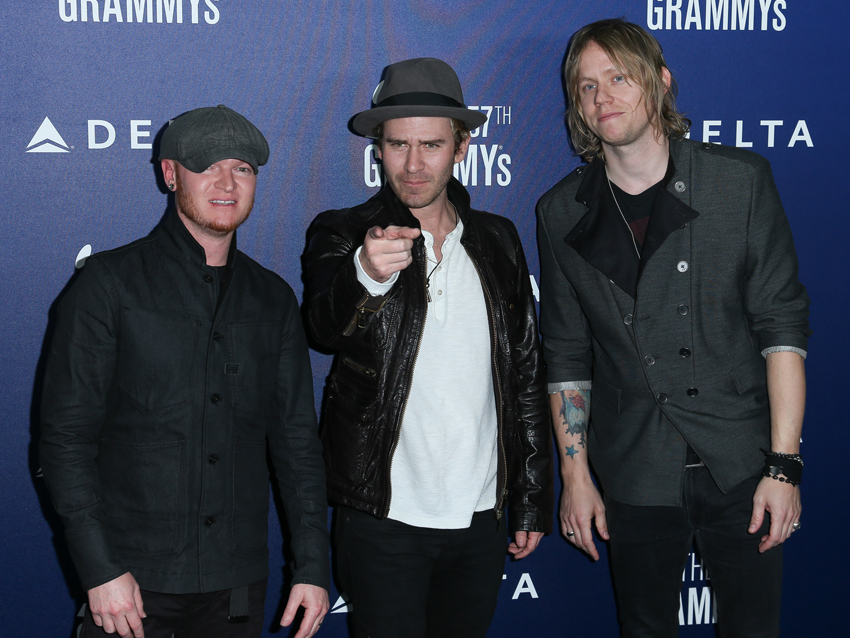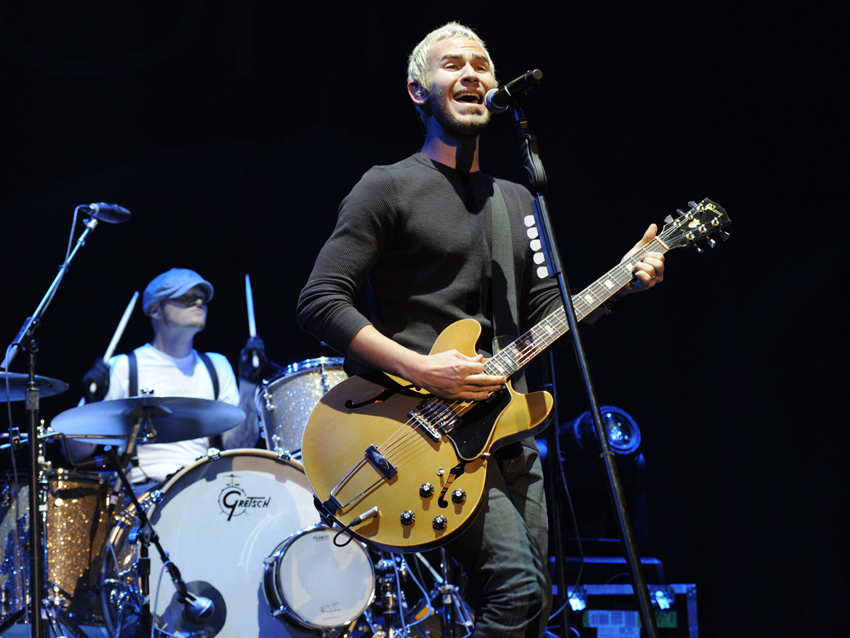
Jason Wade on Lifehouse's new album, Out Of The Wasteland
Most bands look forward to the recording of a new album as being a kind of learning process. But for Jason Wade, lead singer and guitarist of Lifehouse, he hoped that the sessions for the band's upcoming seventh album, Out Of The Wasteland, would be more of an "unlearning experience."
"We were so so green when we made our first album," Wade says. "I ended up getting signed at a time when I wasn’t even looking for a record deal, and then I just fell into this life of making records and touring. Doing that over and over and over again winds you down after a while; you get good at doing the same old tricks in the studio. Now that we’ve left Interscope and we’ve gone kind of independent, I really wanted to make an album that captures that youthful innocence again, like when I was a teenager."
Wade sat down with MusicRadar recently to expand on how he and the band (which also includes Bryce Soderberg, bass, and Rick Woolstenhulme, Jr., drums) shook off creative stasis on the new set, recording with fave producer Jude Cole, and how Jennifer Lawrence fit into the whole thing.
You mentioned finding the innocence again. But is that really possible? You can’t really be the same person or band that you used to be – so much has changed.
“You can get flashes of it. Obviously, you grow and evolve and change. But if you make a conscious effort to catch yourself when you find yourself falling into patterns, you can get back to the kind of purity that used to matter, and that’ll stop you from going through the motions and phoning it in.
“This time, I really tried to do what I could to find those magic moments and write songs that would give me the chills, like I used to in the early days. This album is a series of magic moments and getting chills. Obviously, like you said, it can never be exactly the same, but I think you can get glimpses of it. It’s something to strive for, and I think it’s something the fans can recognize. They know when you’ve lost your zeal and passion, and they know when you’re into it, too.”
On the other hand, when a lot of bands find success, they’re seduced into thinking that they have to do the same thing over and over to keep having hits.
“Yeah, I’ve seen that, sure. But you have to shift gears or else it’ll become stale. For us, it was a matter of making that decision to not get locked into a formula. It was a struggle to get everyone on board. Most of our records were recorded live with everybody in a room. The song would be written, I’d play it for the guys, and then we’d do pre-production and kind of produce it ourselves.
“To get away from that, I decided to go into the studio by myself and throw different sounds down on tape, just to see if I could come up with something that sounded interesting. Then I brought the guys in after the fact to play over the tracks I’d recorded. That was kind of tough, I think, because in the past we’d always recorded in a more traditional fashion."

Working with producer Jude Cole
Above photo: Lifehouse (from left) Rick Woolstenhulme Jr., Wade, Bryce Soderberg.
“The guys were really happy with the end product because we have some stuff that sounds really inspired. Even if it was a little hard at first, they realized there was a bigger picture and that we had to come up with material that rivaled our earlier work.
“To be honest, I was thinking about doing a solo record for a bit, and I was under the assumption that that’s what I was doing for the first year and a half. Then I had a moment of clarity and I realized that I don’t want to be a solo artist. I just don’t have it in my DNA to be that kind of personality. So I think the guys were also thinking that I was going to be off the grid for a bit. They were glad when it finally came down to getting the band back together.”
You’ve worked with Jude Cole for the last few records. What’s the secret to your relationship?
“I think the secret to our relationship is just family. He kind of found me when I was 15, 16 years old when he’d heard some of my early demos. To this day, we don’t have a contract. Everything we do is based on trust and respect and a handshake, so it’s kind of an old-school relationship. Jude has been with us through the ups and downs in our career. So yeah, he's like family. We have a really deep mutual respect. It works."
Did you make elaborate demos for this album? The stuff you did on your own, were they very involved?
“They were, yeah. Hurricane, for example, started as this four-on-the-floor pop song, a lot of keyboards and synthetic sounds, and there was a stripping-back process that went on. We took all the keys and sounds off, and then we put on guitars and real drums. After that, it sounded like a great old-school Lifehouse track. Basically, the process was to throw a bunch of paint on a canvas and then strip it away to see what needs to stay. Once you do that, you get a lot of clarity.”
You mentioned Hurricane – in the video you’re playing your old Jazzmaster. You’ve said that the song is a little reminiscent of Hanging By A Moment, on which you used the Jazzmaster.
“That’s right. I’ve played Gibsons for so long, and I still do live – I play a vintage ‘60s 335. I don’t know – I thought the Jazzmaster was a throwback to a nice, older sound, and because I used that guitar for Hanging By A Moment, I decided to play it on Hurricane.”

On string arranger James Newton Howard
Did you start out with the Jazzmaster and then switch to Gibsons?
“I did. When I started out, I didn’t have any money, so I had a cheap knock-off Epiphone that my dad gave me. When I got my record deal, my first producer, Ron Aniello, and I went to a couple of guitar stores and got a bunch of vintage gear. The Jazzmaster was one of the first guitars I got at that time.
“In the early days, I was playing a lot of Les Pauls, but they got too heavy. I think that because I played so much acoustic guitar I like the feel of the 335 body. It’s got the same sort of girth, but it’s not too heavy, not like a Les Paul. They get a great sound, too, especially through ‘60s Vox amps.”
You and Jude brought in James Newton Howard to do string arrangements. He’s a pretty legendary guy.
“Oh, absolutely. I’ve been listening to his soundtracks for over a decade, so I’m pretty up to speed on his work. I’m a huge film nerd and I love listening to soundtracks. It’s probably my favorite music to listen to. I think James might have produced one of Jude’s albums back in the day, so that’s their connection.
“Jude brought me an unfinished track he’d written with James, and I jumped at the chance to help them complete it because I just wanted to work with James Newton Howard. He’s one of my heroes. We finished the song and it ended up being called Hourglass. James loved it, so we got the opportunity to spend a couple of days with him in the studio and watch him work out the string arrangements.
“It was funny, because he was still working on The Hunger Games, so there was a big picture of Jennifer Lawrence up on his screen for a few days. [Laughs] He’s an amazing guy, really approachable but a genius. I didn’t say anything to him while he worked – I just let him do his thing. He’s such a master.”
I haven’t been to a wedding in a while, but I’ve heard that your song You And Me has become a big wedding song. What’s your reaction to that?
“That’s the song I proposed to my girlfriend with. I think it validates the fact that it came from a really pure, honest place, the fact that people want to use it for their wedding song, without me even talking about it. I’ve always thought that if a song really resonates with you and it’s very personal to you that it’s got a good chance at meaning something to other people.”
But you don’t get paid for it being played at weddings, do you?
“No. Oh, well.” [Laughs]
Lifehouse's Out Of The Wasteland will be released on May 26. You can order the first single, Hurricane, on iTunes and Amazon.
Joe is a freelance journalist who has, over the past few decades, interviewed hundreds of guitarists for Guitar World, Guitar Player, MusicRadar and Classic Rock. He is also a former editor of Guitar World, contributing writer for Guitar Aficionado and VP of A&R for Island Records. He’s an enthusiastic guitarist, but he’s nowhere near the likes of the people he interviews. Surprisingly, his skills are more suited to the drums. If you need a drummer for your Beatles tribute band, look him up.
